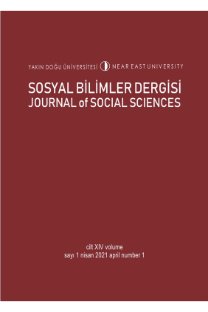Analysing the role of financial derivates in the international emerging markets financial crises in terms of the existing crisis literature: A contribution to the third generation models
Finansal Türev Araçların Uluslararası Finansal Krizlerdeki Rolü Doğrudan Kriz Etkileri ve Dolaylı Kriz Etkileri olarak ele alınabilir. Makale türevlerin finansal krizlerdeki bu rollerini birinci, ikinci ve üçüncü nesil kriz modelleri gibi kriz literatürü açısından analiz etmeyi amaçlamaktadır. Makale esas olarak türevlerin söz konusu rolünü, yeni nesil krizler için türevler açısından en uygun olanı olarak değerlendirdiği üçüncü nesil modellerle birleştirmeyi ve test etmeyi amaçlamaktadır. Bu bağlamda, makale bu potansiyel rollerin ne birinci neslin “hükümetin yanlış para politikaları”nı ne de ikinci neslin “hükümetlerin politika ikilemleri altındaki spekülasyonatakları”nı temsil ettiğini savunmaktadır. Daha çok onlar, üçüncü nesil modellerce kullanılan sorunlar olan finansal piyasa başarısızlıkları, likidite sıkışıklığı, yüksek kaldıraç, yayılma kanalı, firmaların bilançolarının bozulması ve spekülatif riskli sermaye akımlarının teşviğine işaret etmektedir. Bu bağlamda, şayet finansal türev araçların yükselen piyasa finansal krizlerindeki rolü üçüncü nesil bir model çerçevesinde panel data analiziyle test edilirse o zaman ana bulgular göstermektedir ki finansal türevler yükselen piyasa ülkelerini 1990’larda kayda değer risklere ve finansal istikrarsızlıklara maruz bırakmıştır ve söz konusu krizlerde hem doğrudan hem de dolaylı rol oynamıştır.
Uluslararası yükselen piyasa finansal krizlerinde finansal türevlerin rolünün mevcut kriz literatürü bakımından analizi: Üçüncü nesil modellere bir katkı
CİLT 6 SAYI 2 6sayi2 Ayca Sarıalioğlu Hayali, Analysing the Role of Derivatives in the International Emerging Markets Financial Crises in Terms of Existing Crises Literature: A Contribution to the Third Generation Models Ebru Oğurlu, Doğu Batı Söylemleri Çerçevesinde Türkiye- Avrupa/Avrupa Birliği Algı(lama)ları. Elena Shadrina, State Capitalism and Russia’s Energy Policy in Northeast Asia Esin Acar, Özge Yiğit, Toplamsal İfadeler İçeren Problemlerin Çözümündeki Tersine Çevirme Prensibi Uygulamaları Güliz Muğan Akıncı, Ideological Process of Shopping Malls within the Framework of ‘Glocalization’ İlksoy Aslım, Grivas: A hero of United States? – An American Perspective Muhittin Tolga Özsağlam, State Centric Russian Energy Policy & Rapprochement in Russia-Turkey Relations Nuran Aytemur, Köy Enstitüsü Mezunlarının Halkçılık Anlayışının Eleştirel Bir İncelemesi Şakir Dinçşahin, Melis Ergenekan, The Development of Nationalism and Democracy in India ANALYSING THE ROLE OF FINANCIAL DERIVATES IN THE INTERNATIONAL EMERGING MARKETS FINANCIAL CRISES IN TERMS OF THE EXISTING CRISIS LITERATURE: A CONTRIBUTION TO THE THIRD GENERATION MODELS Ayça SARIALİOĞLU HAYALİ ABSTRACT The Role of Financial Derivative Instruments in International Financial Crises can be tackled as Direct Crisis Effects and Indirect Crisis Effects. The paper aims to analyse these roles of derivatives in the financial crises in terms of crisis literature, such as first, second and third generation models of crisis. It mainly aims to connect and test such role of derivatives with the third generation models, which the paper tackles as the most appropriate one for the new generation crises in terms of derivatives. In this regard, the paper maintains that these potential roles present neither “wrong government monetary policies” of the first generation nor “speculation attack under policy tradeoffs of governments” of the second generation. Rather they point to the financial market failures, illiquidity, high leverage, contagion channel, balance sheet distortions of firms and fuelling the speculative risky capital inflows, which all refers to the issues used by the third generation models. In this respect, if the role of financial derivatives in emerging markets financial crises is tested within the framework of a third generation model by a panel data analysis then the major findings indicate that financial derivatives have exposed emerging markets to remarkable risks and financial instabilities in the 1990s and they had role in such crises both directly and indirectly.
___
- ISSN: 1986-1303
- Yayın Aralığı: Yılda 2 Sayı
- Başlangıç: 2008
- Yayıncı: Yakın Doğu Üniversitesi
Sayıdaki Diğer Makaleler
State centric Russian energy policy and rapprochement in russia-Turkey relations
State capitalism and Russia’s energy policy in northeast Asia
The position of grivas in Us’ Cyprus policy
Toplamsal ifadeler içeren problemlerin çözümündeki tersine çevirme prensibi uygulamaları
Ideological process of shopping malls within the framework of ‘glocalization’
Doğu-batı söylemleri çerçevesinde Türkiye – Avrupa/avrupa birliği algıla(mala)rı
Köy enstitüsü mezunlarının halkçılık anlayşının eleştirel bir incelemesi
